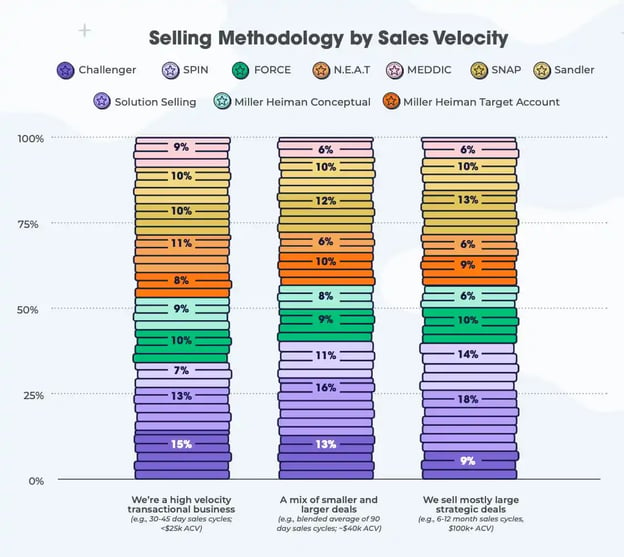There's no denying that sales can be chaotic. Prospects can be unpredictable. Sales technology might be unreliable, and every rep is bound to deal with their share of curveballs here and there.
.jpg?width=595&height=400&name=Process%20vs%20Methodology%20%281%29.jpg)
It's a volatile field that requires composure, and that responsibility doesn't always fall squarely on reps themselves. Sales orgs need to do what they can to keep things on as even a keel as possible.
Reps need structure and consistency. There needs to be some degree of rhyme and reason to your sales reps' efforts — rhythm and progression that keep your reps on track and your org's operations cohesive.
That's where sales processes come in — they define a course for your reps to follow and fall back on. Every sales org needs one, and if you want yours to be as impactful as possible, you need to back it with a fitting, effective sales methodology.
Here, we'll go over those two concepts, see how they differ, explore how one informs the other, get a feel for why each is so important, and review how you can implement one of your own.
Sales Process vs. Sales Methodology
The difference between a sales process and a sales methodology comes down to specificity. A sales process is a series of actionable steps — unique to an organization — that salespeople follow. A sales methodology is a broader philosophy or set of practices that can inform how a sales process is built and conducted.
Almost every company has its own sales process — a progression shaped by factors like the nature of its industry, its target personas, its market position, and the structure of its sales organization. Ultimately, it's a series of steps made by a business for that business.
Sales methodologies aren't as unique — they're publicly available, accessible, and often widely applicable. And individual sales orgs aren't usually responsible for their creation and popular implementation.
No, they're typically developed by sales vendors or consultants, and they represent pointed but understandable approaches to driving broader sales effectiveness and developing individual reps' sales skills.
In many cases, a business that adopts a certain methodology will only apply it to certain stages or phases of a sales process. Some are tailored exclusively to suit portions of a sales lifecycle like discovery, qualification, or demos.
For example, the "Challenger" methodology — a strategy rooted in teaching prospects, tailoring communication to suit those prospects individually, and taking control of conversations — is often applied specifically to the front-end of a sales process. That said, many organizations leverage it to inform the full sales lifecycle.
Sales Processes in the Context of Sales Methodologies
Your sales process can set you apart from your competition — it's a key component of your company's identity. That's why it serves you to be thoughtful and at least somewhat distinct when putting yours together.
Adopting a sales methodology — or fusing multiple methodologies — can be a big help when constructing a successful sales process. It can give you a solid basis for the mentality and strategies your reps bring to interactions with prospects.
In many cases, sales methodologies come with their own generic sales process attached to them. But you're best off making adjustments to fit your business's specific interests and process. After all, if you sell investment packages, you shouldn't be using the same process as a company selling mining equipment just because you leverage the same methodology.
Once you have your ideal methodology and process lined up, fully commit to them. Thoroughly train your reps on both. Let them know the ultimate goals of these adjustments, make sure they're compelling enough to warrant the extra effort.
Why You Need a Sales Methodology
A solid sales methodology an entire sales org can get behind can be central to optimizing efficiency within that organization and getting the most out of its sales process. Though many sales methodologies require some monetary investment and extensive training, the pay-off that comes with adopting one is often well worth it.
Of the companies with over 10,000 employees surveyed in the MetaCX and Revenue Collective's State of Sales Methodologies in B2B SaaS report, nearly 60% said the methodologies they've adopted have more than paid for themselves — relative to 27% who were skeptical as to whether their investment in a sales methodology paid off.
And methodologies can help sales reps individually just as much as they help sales organizations as a whole. 88% of salespeople trained in The Sandler Selling System — a popular sales methodology revolving around salespeople and prospects being equally invested in a sale — said their sales strategy improved as a result of becoming familiar with the methodology.
One way or another, having some kind of guidance to help shape your sales process and reps' sales acumen helps you create consistency and sustain efficiency across your sales org. Investing the time and resources necessary to adopt a sales methodology is one of the better ways to make that happen.
What sales methodology will work best for me?
With all this in mind, you might be wondering, "What sales methodology is going to work best for me?" Well, it's hard to say — the crux of the issue is less about getting fixated on which one works best and more about committing to whichever one you go with.
According to MetaCX's State of Sales Methodologies in B2B SaaS report, companies tend to adopt methodologies that fit their selling motions. The report showed an eclectic distribution of the specific sales methodologies the surveyed businesses leveraged. It indicates that "high-velocity transactional businesses use Challenger more than others, while hybrid and strategic sellers use Solution Selling most frequently.
"Smaller organizations use Solution Selling more often than larger organizations, as did companies selling through channels. Individual contributors prefer MEDDIC, as do first-line managers. Executives favor Challenger and NEAT above others."

So, what does all of that mean? Well, by MetaCX's account, not much. According to the report, sales orgs should "pick the flavor they like best. Then get religious about how it’s applied, not which one they choose."
A unique sales process can be central to differentiating your business from your competition and getting as much as possible out of your sales efforts. Building and consistently executing an effective one requires a thorough understanding of your company's external circumstances, internal structure, industry, and market position — among other factors.
But a sales process can only be so effective without a guiding philosophy, mentality, and set of strategies behind it. Sales methodologies provide those components, so any sales org looking to provide a roadmap for reps that delivers results should look into adopting one.







.jpg)


